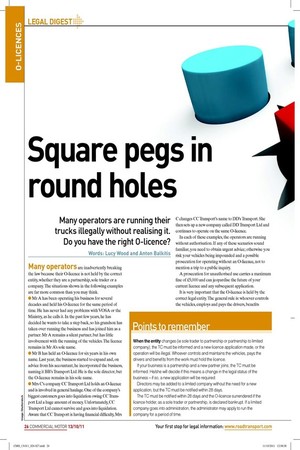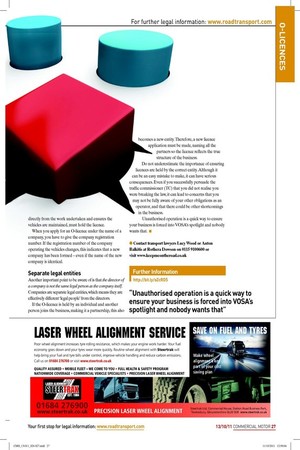Square pegs in round holes
Page 21

Page 22

If you've noticed an error in this article please click here to report it so we can fix it.
Many operators are running their trucks illegally without realising it. Do you have the right O-licence?
Words: Lucy Wood and Anton Balkitis Many operators are inadvertently breaking the law because their O-licence is not held by the correct entity, whether they are a partnership, sole trader or a company. The situations shown in the following examples are far more common than you may think.
• Mr A has been operating his business for several decades and held his O-licence for the same period of time. He has never had any problems with VOSA or the Ministry, as he calls it. In the past few years, he has decided he wants to take a step back, so his grandson has taken over running the business and has joined him as a partner. Mr A remains a silent partner, but has little involvement with the running of the vehicles. The licence remains in Mr A’s sole name.
• Mr B has held an O-licence for six years in his own name. Last year, the business started to expand and, on advice from his accountant, he incorporated the business, naming it BB’s Transport Ltd. He is the sole director, but the O-licence remains in his sole name.
• Mrs C’s company CC Transport Ltd holds an O-licence and is involved in general haulage. One of the company’s biggest customers goes into liquidation owing CC Transport Ltd a huge amount of money. Unfortunately, CC Transport Ltd cannot survive and goes into liquidation. Aware that CC Transport is having inancial dificulty, Mrs C changes CC Transport’s name to DD’s Transport. She then sets up a new company called DD Transport Ltd and continues to operate on the same O-licence.
In each of these examples, the operators are running without authorisation. If any of these scenarios sound familiar, you need to obtain urgent advice; otherwise you risk your vehicles being impounded and a possible prosecution for operating without an O-licence, not to mention a trip to a public inquiry.
A prosecution for unauthorised use carries a maximum ine of £5,000 and can jeopardise the future of your current licence and any subsequent application.
It is very important that the O-licence is held by the correct legal entity. The general rule is: whoever controls the vehicles, employs and pays the drivers, beneits directly from the work undertaken and ensures the vehicles are maintained, must hold the licence.
When you apply for an O-licence under the name of a company, you have to give the company registration number. If the registration number of the company operating the vehicles changes, this indicates that a new company has been formed – even if the name of the new company is identical.
Separate legal entities
Another important point to be aware of is that the director of a company is not the same legal person as the company itself. Companies are separate legal entities, which means they are effectively different ‘legal people’ from the directors.
If the O-licence is held by an individual and another person joins the business, making it a partnership, this also becomes a new entity. Therefore, a new licence application must be made, naming all the partners so the licence relects the true structure of the business.
Do not underestimate the importance of ensuring licences are held by the correct entity. Although it can be an easy mistake to make, it can have serious consequences. Even if you successfully persuade the trafic commissioner (TC) that you did not realise you were breaking the law, it can lead to concerns that you may not be fully aware of your other obligations as an operator, and that there could be other shortcomings in the business.
Unauthorised operation is a quick way to ensure your business is forced into VOSA’s spotlight and nobody wants that. ■













































